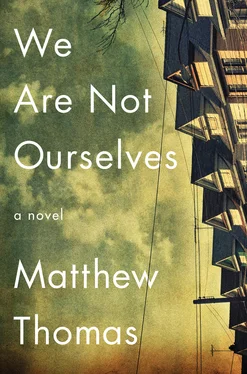It didn’t hurt that her father, who had promised to haunt her until she and Ed owned a house, would be appeased. She’d been thinking of her father’s curse more and more lately. She could make the case that she’d been in a house long before he was dead, and that it was just a matter of signing a few papers to make it officially hers. He would appreciate the neatness of such a solution.
“This is all very sudden,” she said.
“I’d sell it to you at a discount,” he said. “I’d only ask that you keep my family on at an affordable rent.”
“I’ll talk to my husband about it.”
“Please do,” he said. “I’m going to have to move quickly, one way or the other.”
Her mind was churning. She didn’t like being on an upper floor, especially after Ed’s cousin’s kid in Broad Channel, playing Superman, had climbed out onto a second-story roof, jumped, and broken an arm and a leg. And she was tired of not having a driveway of her own. She used to consider herself lucky that Angelo allowed her and Ed to park in the driveway at all, but that gratitude had worn off, and now it nettled her to have to walk around the house to get to her door, or to have to ring Angelo’s bell when she was blocked in.
“There’s one thing I would want,” she said.
“You name it.”
“I would want to switch apartments. I would want to be on the ground floor.”
“It’s your house,” he said.
“And one other thing.”
“What’s that?”
“I would ask you to park your car on the street,” she said. “I would want the driveway clear for our use.”
He seemed to chew on what she’d said. His mouth rose at the corners in a forlorn smile at the concessions his situation — she realized that she didn’t care to know the first thing about it, not the first thing — had forced upon him.
“No problem,” he said, regaining the momentum he’d briefly lost. “There’s plenty of parking around here. Worst case, I walk a block or two.”
“And we’d need the garage cleaned out.”
“Everything will come out of there.”
“And the cedar closets in the basement. You can have the ones we use now.”
She thought she heard him whistle. She couldn’t tell if he was taken aback or impressed by the bargain she was driving. “All of these details can be arranged,” he said. “We can work together on this.”
“I just needed to get these things out in the open.”
He picked up her keys from the bowl on the mule chest and let them twirl in his fingers. “I got you.”
“I’ll talk to Ed.”
“And you’d keep us on?”
“Yes.”
He dropped the keys and straightened up. “At affordable rents?”
“I wouldn’t charge an arm and a leg,” she said. “You folks are like family now.”
“Even if I die?”
“Angelo! My God.”
He gave her a look that suggested he saw her not as a woman but as another man. “I’m asking: even if I die?”
“Even if you die. Of course.”
“I just want to know my family is taken care of,” he said. “I’m not looking to break the bank. I just want to take care of my people.” He backed toward the stairs.
“I understand,” she said, stepping toward him.
“Why don’t we find out how much houses like this are going for, and then you can give me less than that.”
“I need to talk to my husband,” she said again. “We’d have to qualify for a mortgage.”
“Don’t worry.” He had taken a step downstairs and he turned, smiling fully now, so that he almost appeared mirthful. “People like you, with all your affairs in order — you can have anything you want in this country.”
Part II. The Salad Days Thursday, October 23, 1986
Eileen was understaffed again, so she had to stay late filling out charts and writing notes, and when she went around to dispense a final round of meds in little paper cups, one patient crashed his fist into his mouth in that way stupid people did when trying to look cool taking pills or eating peanuts, and he missed and sent the pill skittering across the linoleum floor. Pharmacy wasn’t picking up the phone, and she was out of that medication, so she got down on all fours and searched for it. A quarter of an hour later she found it covered in dust under the far bed. She reached her arm up with it from under the bed in a gesture of mutual victory, but as she crawled out backwards on her hands and knees, she saw that he was staring idiotically at her rear end, which she’d left hovering as she focused on the task at hand. She wanted to cram the pill in his mouth and slam his jaw shut, cracking his teeth, but she wasn’t about to let a useless fool like this defeat her poise, so she just placed it back in the little cup. In her chosen profession (in fact she felt it had chosen her, in a kind of malevolent possession) even administrators weren’t spared feeling like pieces of meat.
It was almost six thirty when she hit Eastchester Road. The Hutch was moving, thank God, and the Mets were in Boston, so maybe it wouldn’t be so bad on the other side of the bridge. The traffic during the playoffs had been a nightmare: mindless, endless, pointless; very nearly proof of the randomness of the universe. Her sciatic nerve was throbbing and her feet were going numb, and she didn’t have it in her to sit there inching along.
As she approached the Whitestone and the road sloped up toward the start of the cables, she felt her mood lift. Her time on the bridge was the only part of her commute she didn’t mind. She loved the way the cables shot up in a triumphant curve as the first arch neared and then plunged down immediately afterward. Sometimes — it was happening now — the music on the radio matched the rhythm of the bridge. The cables climbed toward the second arch, and she felt herself in the uncanny presence of beauty. Nothing else in her day stirred her to the contemplation of abstract ideas. The bridge was making an argument for its own soundness as she drove over it. High above the East River, the sharp focus of ordinary life gave way to hazy impressions as the eye worked to contain the vastness it beheld. Then the cables rolled into anchor, the landscape resumed a human scale, and that hopeful notion she’d conceived for the evening at the peak of the span began to recede.
At least the traffic was flowing. She’d be home by seven at this rate. She had called at five to say she expected to be quite late and to ask Lena to feed Connell, and then she’d called again before she left and said not to feed him. Lena had assured her it was no trouble, and Eileen had heard the touch of sharpness in her own voice when she’d said she wanted to have dinner with the boy herself. She had put chicken in the fridge to defrost it, and if she didn’t cook it, it was going to go bad.
That morning, she’d decided that they were going to have a family meal, even though Ed wouldn’t be there with them. If he was forcing her to compromise on her ideal of family time by continuing to teach these night classes, then a compromise was all she could stand anymore, not the complete capitulation she’d made lately on nights he taught, when she let Lena feed the boy and took a restless bubble bath before she went up to get him. She and Connell were enough to make up a family; in fact, they were plenty. In some families, mother and child was all there was. She didn’t need Ed to be happy.
She was angry at Ed for the class that met two nights a week, and she was angry at him for staying late another night to attend to his research. If he was going to be away this much, at least he could be making good money doing it. His turning down the job at Merck still bothered her, and the fact that he’d spent these years taking on extra instruction only served to make him seem more irresponsible somehow.
Читать дальше
Конец ознакомительного отрывка
Купить книгу












